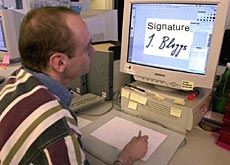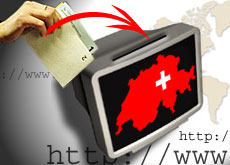Switzerland sees technology as key to democracy

Switzerland has urged the international community to make information technology accessible to all and bridge the digital divide between North and South.
Speaking at a conference on e-Government, Communications Minister Moritz Leuenberger said modern technology was an important tool for democracy.
“Information technology should be actively used to promote the development of democracy. It does not belong to a museum,” Leuenberger told the European Union’s Ministerial Conference in northern Italy.
Speaking to 1,000 delegates from 47 countries, he said it was vital that the developing world caught up with the West in terms of access to technology.
“It is our mission to make modern technology accessible to everybody,” Leuenberger said. “People living in developing countries can only escape poverty if they have access to information.”
Leuenberger called on Europe to play an active role in this process and on the World Summit on the Information Society, which is due to take place in Geneva later this year, to seek a solution to the problem.
Italian presidency
The two-day conference that ended on Tuesday was the first event of the Italian presidency of the EU and was jointly organised by the Italian government and the European Commission.
It was chaired by the Italian minister for innovation and technologies Lucio Stanca, and Erkki Liikanen, the European Commissioner for Enterprise and the Information Society.
Before the conference on the shores of Lake Como, Liikanen said that even though much progress had been made in e-governance in Europe, there was still a lot of work to be done.
“Most of the e-Government applications provide information online that can be viewed and downloaded, but interaction possibilities have often been minimal.
The challenge for the next generation of services is to help people change from ‘being in line’ to ‘being online’,” he said.
Substantial gaps
Earlier this year the Centre of Excellence for Electronic Government of the University of St Gallen published the first comprehensive survey of e-Government at all three levels of Swiss public administration.
Entitled “Electronic Government Barometer: Progress Report on e-Government in Switzerland 2002”, the study showed that while considerable efforts were being undertaken to introduce e-Government within the country, substantial gaps still existed.
Conducted last year among organisations operating at a federal, canton and municipal level, the study found that while more than one third of municipalities have no website, all major Swiss cities are expected to be offering online information on all subjects in the near future.
Taken as a whole, the websites offered only a limited number of services and consequently were often underused.
The study also showed that Swiss e-government projects often suffer from a lack of adequate management, which was attributed to an absence of clear objectives and strategy.
But in a step forward for e-government, the House of Representatives last month approved proposals to give electronic signatures the same status as written ones.
If passed by the Senate, the legislation could go into effect at the beginning of 2005.
swissinfo with agencies
The European eGovernment conference took place in Cernobbio in Italy between July 7 and 8.
More than 1,000 delegates from 47 countries attended the conference.
The World Summit on the Information Society is taking place in Geneva from December 10 to 12 this year.

In compliance with the JTI standards
More: SWI swissinfo.ch certified by the Journalism Trust Initiative


You can find an overview of ongoing debates with our journalists here. Please join us!
If you want to start a conversation about a topic raised in this article or want to report factual errors, email us at english@swissinfo.ch.